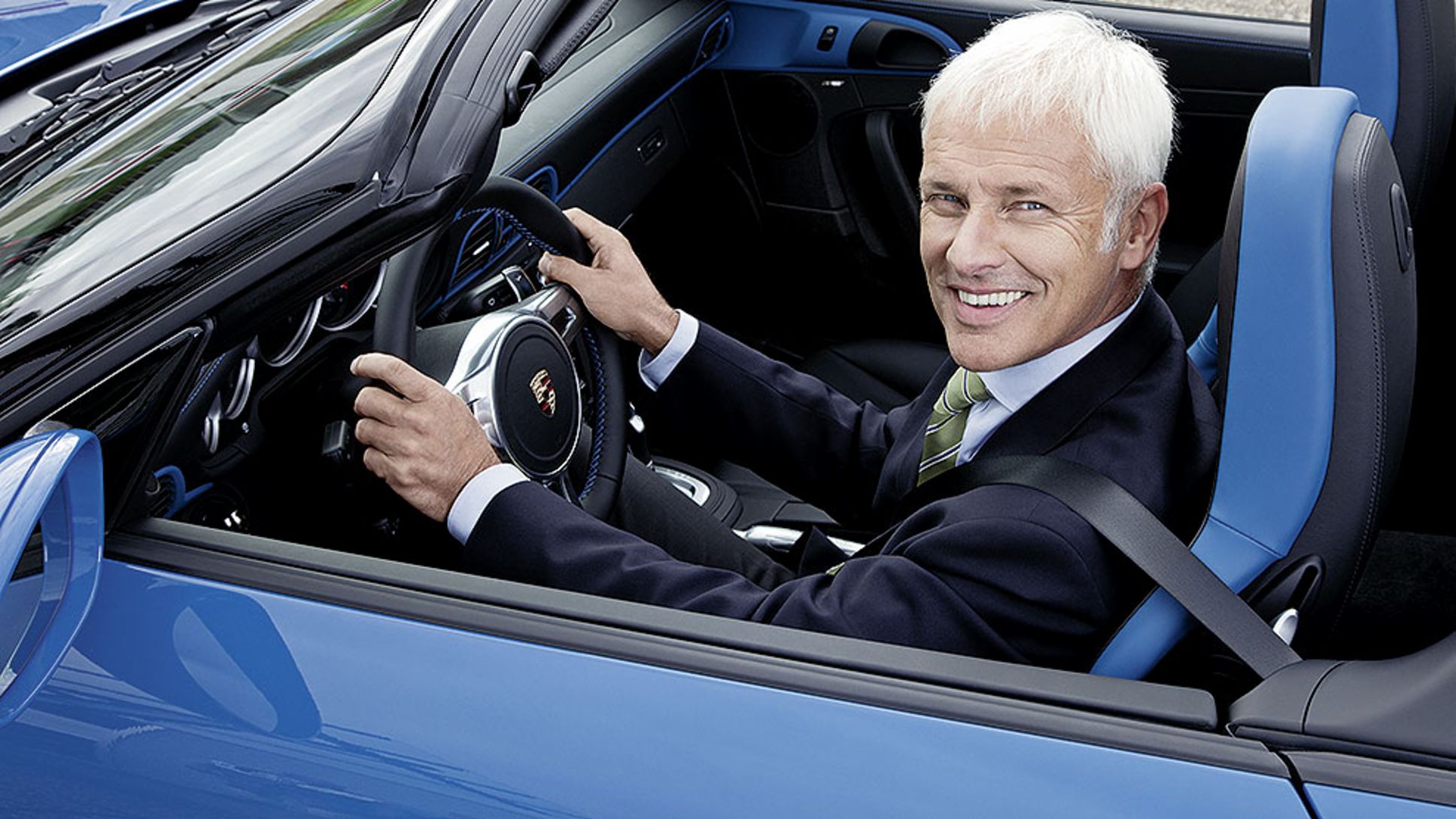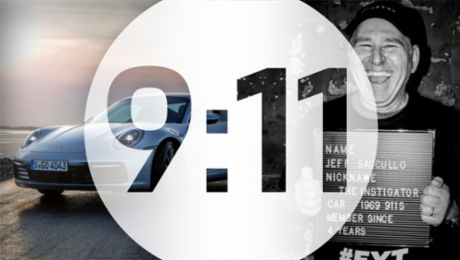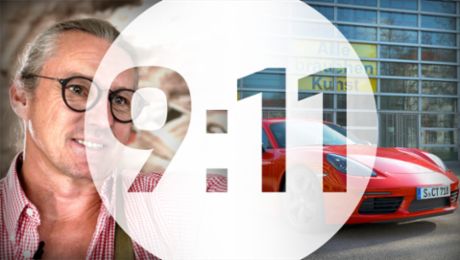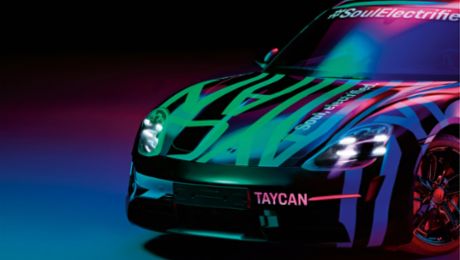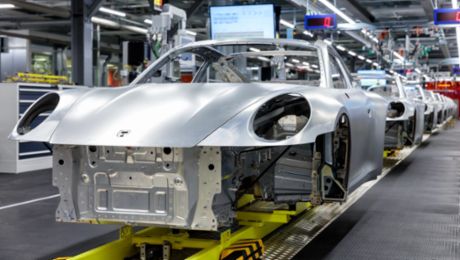Jay Leno: Some cars are merely cars. But to me, a Porsche is far more than that. How do you do it, Mr. Müller?
Matthias Müller: Each and every Porsche not only has its own identity; it has its own soul as well. Whenever I sit in a Porsche, I feel the product, I experience the product. The 911 is a good example of what I mean, because driving a 911 is different from driving any other car. I believe that you'd be hard pressed t find another company with products that are so powerful, so distinctive, and so appealing.
Leno: To me, the Porsche brand is an icon. Can you think of anyone else’s inventions that were such an early influence on the history of the automobile? Now, what was the name again of the first hybrid system? Lo…, Lo…, right, Lohner! And hasn't the same basic philosophy continued to this day? Good, solid, creative engineering: that's what I like. And Porsche should never change that.
Müller: I can promise you that we never will. The Lohner-Porsche Semper Vivus is truly a perfect example. Over 110 years agao, Ferdinand Porsche was already paving the way in the area of electric power systems. The same art of engineering that was ahead of its time back then continues to move us forward today.
Leno: For me, quality is an absolutely crucial part of identity. There are a few sports cars I know that I bet wouldn't even make it to 30,000 miles. But when I head to the studio every morning, I see Porsches that have been on the road for sixty years. And they are as great as ever.
Müller: These days the term sustainability is often overused, but in our case it really does fit. So our designers don't always have it easy. Icons represent stability; you can't make fundamental changes to them. You have to adapt, arrange, integrate them. I firmly belive that it is this very continuity that makes Porsche so inimitable.
Leno: Many companies claim every few years that they have created the car of the future. But only Porsche gives me a car that is equally at home on shopping expeditions and on the racetrack.
Müller: The 911 is more than just a new car. It is our brand; it is our benchmark for today, for tomorrow, and for the day after tomorrow. If we should ever ask ourselves where we want to be, a look at the 911 would tell us right away. That is our standard.
Leno: Exactly. As I say, history repeats itself. If you buy a 911 today, you’re not going to see a completely different model on the market next year. I like to see people and brands staying true to their philosophy. But I also like the evolutionary process in the 911. If a model undergoes a genuine modification, the car is not simply built differently. It is really a much better car.
Müller: People know that they are getting something that is truly one of a kind is becomes part of brand identity as well—this concept of uniqueness, of not being just anyone or anything. I think that these customers are primarily those who have achieved something, who want to a afford something, but who also have remained grounded. They don’t need to put on a show, but they would like to afford something that does not need to be justified. The decision to drive a Porsche is a deliberate, purposeful one.
Leno: I do believe that an automobile can confer an identity on the person who drives it. In my TV show Leno’s Garage, I’m often asked, “Jay, what sports car should I buy to make a great impression on women?” Well, that’s a question I can’t answer, because I buy my cars for myself alone, not for anyone else. It’s comparable to my fascination with mechanical wristwatches. I love listening to the clicking of the gears, sensing the balance of the car. I need the feeling that I get when I hold fast to the steering wheel. To me, that is a lived identity.
Müller: An interesting thought. Till now, character traits were something that I associated with people rather than with companies or cars. I see Porsche as a very driven entity, proud, very familial, intelligent, sometimes with a Swabian air, and with a high degree of social competence. And we at Porsche think of ourselves as a team.
Leno: You can see that in the automobiles. I own a 911 from 1963 and a Carrera GT built in 2005—and the commonalities are clear despite all the differences.
Müller: Yes, that is what I mean by a “Porsche feeling. The bottom line is engineering that can really be sensed and experienced. Not engineering for engineering’s sake, not at all; engineering for the feeling that you get when you drive a Porsche. I recently drove the Mille Miglia in a 550 Spyder at was authentic, truly puristic. Engaging gears, pure mechanics, and then a burst of power as the engine and gear transmission merge, as energy unfurls and is expressed in sound. That gives me goose bumps.
Leno: Will Porsche’s identity change if more vehicles are built and purchased? That’s how it is in business: Expand or expire! I’m certainly no fan of SUVs, but I can understand that they help companies keep afloat. And if that is what it takes to ensure that the 911 will be built forever and ever, then I can live with that.
Müller: Many people are concerned with the question of where exclusiveness ends. We are rmly focused on that. Other model series have impressively demonstrated that it does work. A Porsche must only be the sportiest vehicle on offer in a given segment, with character traits specific to our brand—and only our brand. Let’s take the Panamera, for example: to me, the Panamera isn’t a sporty sedan, but rather a sports car in sedan format. Now, that is what I mean by identity.
Leno: There is a lot of discussion about alternative drive systems. I don’t think that hybrids spell the end of the sports car. I think of it more in the sense of a new beginning. I still remember how we argued when water cooling was introduced. Hey, people, wake up—a new era calls for new concepts. In my view, the 918 Spyder is the first new sports car of the millennium. But it can’t be all about getting 60 miles to the gallon—where’s the pleasure if you are crawling at a snail’s pace?
Müller: There are always things that at first glance don’t seem to belong together. And naturally, a sports car with a hybrid drive would never be anyone’s first choice. But Porsche’s specialty is racing, a field in which testing new technical solutions is a must. The 911 GT3 R Hybrid has already demonstrated what we are capable of. People’s attitudes toward mobility are changing, and a company has to adapt to a changing society. People still want to get around on their own, but not at the same level of energy consumption as in the past. And the new 911 takes this into account. Its lighter weight means improved driving performance.
Leno: I like the Porsche engineers’ approach. It’s a rule from sports that they learned early on: Give us the rules; we’l find the solution. The ones I have met are all fighters. That’s something I see as an integral part of identity. Even more: in my opinion, it represents your company’s greatest virtues.
Müller: Our claim is that we have mastered contrasting pairs. For example, we have taken design and functionality—two things that at first glance appear to be in conflict with one another—and brought them into harmony. The same principle applies to tradition and innovation. And the 911 is our benchmark here as well.
Leno: My hope is that Porsche will continue to imbue its automobiles with character, and never lose its identity. It is important to appreciate the past. In my view, a car manufacturer must bring perfection and passion together in order to hold its own. You need an A to survive in this industry. And if you want to be Porsche, you need an A+.
Müller: As far as I’m concerned, stagnation means taking a step backwards. And we know from our own tradition: it’s always possible to improve.
Leno: Whenever I want to explain how your country impresses me, I always tell the story of a lunch break I once took in a medieval town while on a test-drive. One church on the left-hand side, a second church on the right. Both sets of church bells rang at the same time: twelve noon. And I mean exactly at the same time, down to the second! In most countries, you’d be happy if you heard any church bells at all. So to me, that typifies German engineering; that is how I see “identity.” And isn’t that something shared by all Porsche employees?
Müller: Every one of our employees has the Porsche bug: a love of detail without being infatuated by it. Quality is our benchmark, and no exceptions are made in this regard. Quality enables us to create sustainable products. Identity must be reflected in action. Our customers are more concerned with the identity of the Porsche brand than are the customers of other brands. And that is what makes it all so exciting.
Info
Text first published in the Porsche customer magazine Christophorus, no. 352
Consumption data
911 (Type 991): Combined fuel consumption: 9.0 – 8.2 l/100 km; CO₂ emission: 211 – 191 g/km
918 Spyder: fuel consumption: 3.1 l/100 km; CO₂ emission: 72 g/km; Electricity consumption 12.7 kWh/100 km
918 Spyder (Weissach package): fuel consumption: 3.0 l/100 km; CO₂ emission: 70 g/km; Electricity consumption: 12.7 kWh/100 km
Panamera: Combined fuel consumption: 10.7 – 8.4 l/100 km; CO₂ emission: 249 – 196 g/km
Panamera S E-Hybrid: Combined fuel consumption: 3.1 l/100 km; CO₂ emission: 71 g/km; Electricity consumption: 16.2 kWh/100 km
